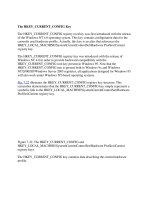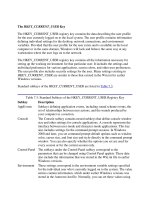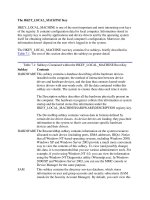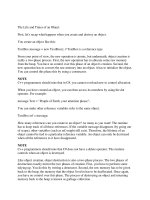Tài liệu The 20 Key Principles of Goal Setting pot
Bạn đang xem bản rút gọn của tài liệu. Xem và tải ngay bản đầy đủ của tài liệu tại đây (66.55 KB, 8 trang )
The 20 Key Principles of Goal Setting
Drew Pierce
Copyright 2012 by Drew Pierce
Smashwords Edition
"A goal properly set is halfway reached." - Abraham Lincoln
Do you want to start seeing changes in your life? I’m here to tell you
that you can and that you will if you follow these simple principles. All
I ask is that you dare to dream. Ask yourself, “If I knew I could not fail,
what would I do?” Dream as you did when you were a child; when you
had a world of opportunity and possibilities. Dream as though you
have no limits, because honestly you don’t. These 20 simple, but key
principles will jump-start your life again; give you new energy,
excitement, passion and leap you forward from where you are now to
where it is that you want to go, faster than you ever dared to dream.
1 – Burning Desire
“Success is focusing the full power of all you are on what you have a burning
desire to achieve.” – Wilfred Peterson
The first principle of goal setting is to have a burning desire. This is
not something that you can train yourself to have, you either have it or
you don’t. You may be able to stay focused on your task or goal for a
short time, but without a burning desire you will inevitably lose steam.
2 – Have One Major Goal
(In each area of your life - spiritual, financial, health, etc.)
“There is one quality which one must possess to win, and that is definiteness
of purpose, the knowledge of what one wants, and a burning desire to possess
it.” – Napoleon Hill
About 95% of all Americans do not have goals. Out of the remaining
5% of Americans that do have goals, most set too many goals. Why is
this a problem? Because without one major definite purpose or goal
you have no clarity, you are no closer to accomplishing any of your
goals than the 95% of Americans that don’t set goals at all. Your goals
must be clear and specific.
3 – Set Goals that are Achievable Yet Stretch You
"You have to set goals that are almost out of reach. If you set a goal that is
attainable without much work or thought, you are stuck with something below
your true talent and potential." - Steve Garvey
So many times we do one of two things while setting goals: we either
set our goals too high or too low; rarely do we set them just right. This
element of goal setting can be extremely difficult, especially without
much experience using this process.
By setting our goals too low we never reach our full potential to what
we can accomplish and never live a self-fulfilling life. By setting our
goals too high we risk becoming discouraged because the goal is so far
out of reach.
4 – Set Goals that are Measurable
“Determine a single measure that you can use to grade your progress and
success in each area of your life. Refer to it daily.” – Brian Tracy
Goals are to be measurable solely for the benefit of being able to track
your progress. It is no different than tracking your progress while
driving your car to work. When you drive your car to work you know
how far you’ve gone and how far you need to go. It is simply not
enough to say, “I want to be physically fit.” How will you know if you
are physically fit? Try instead being more specific, an example of this
might be, “I run a 7 minute mile”. It’s clear, precise, and measurable.
5 – Write Down Your Goals
“Write it down. Written goals have a way of transforming wishes into wants,
cant’s into cans, dreams into plans, and plans into reality. Don’t just think it
– ink it!” – Author Unknown
Be sure that when you write down your goal it is clear, positive, and in
present tense. An example of this is, “I earn $100,000 per year”. By
simply writing down your goal you are making it become alive; you are
making your goal a reality.
6 – Set an Achievement Date
“Goals are dreams with deadlines” - Diana Scharf Hunt
Parkinson’s Law says, “Work expands so as to fill the time available for its
completion.” The more time we give ourselves to accomplish a task or
goal, the more time it takes us to accomplish it. Therefore, we must
learn to use Parkinson’s Law to our advantage by setting shorter time
frames in which to complete the goal or task.
7 – Identify All Possible Roadblocks and Setbacks
“When you confront a problem you begin to solve it.” – Rudy Giuliani
Identifying roadblocks should not discourage you but help you avoid
any unexpected setbacks that may occur; enabling you to create the
most effective plans possible. By recognizing obstacles your mind
should then begin to think of solutions to solve these possible
situations. In Robert Kiyasaki’s classic, Rich Dad Poor Dad, Kiyasaki’s
“rich dad” teaches him how the mind of the rich are different than that
of the poor. When the poor see something that they desire but is
beyond their current budget they say, “I can’t afford that.” While the
rich say, “How can I afford that?” Think as this rich dad and apply it not
only in finances, but also in all areas of your life.
8 – Create Your Key Indicators
“First you write down your goal; your second job is to break down your goal
into a series of steps, beginning with steps which are absurdly easy.” –
Fitzhugh Dodson
An example of a key indicator is the number of cold calls that you will
make. After deciding the key indicator you set a goal for that specific
key indicator. This step is to help you identify the most important
tasks that need to be done on a daily basis that bring you closer to
accomplishing your goal. By doing what needs to be done first and
seeing that task to the end, you will actually spend 80% less time on
that task than if you tried doing the same task in smaller increments.
9 – Make Plans
“Planning is bringing the future into the present so that you can do something
about it now.” – Alan Lakein
Trying to accomplish a goal with no plan is like trying to build a
skyscraper without first taking the time to map out the blueprints.
Without blueprints the construction process will be slow, frustrating,
and extremely expensive. The same also applies to your goal; if you
don’t take the time to make plans, then accomplishing your goal will
be slow, frustrating, and expensive. The cost may not always be in
monetary value, but in time wasted, broken relationships, etc. Make
plans so that you can begin to create the future you want now.
10 – Be organized
“In this world no one rules by love; if you are but amiable, you are no hero; to
be powerful, you must be strong, and to have dominion you must have a
genius for organizing.” – John Henry Newman
If you are to have dominion over your own life you must be organized;
and to truly be organized you must be organized in each and every
single way of your life. If your physical surroundings are cluttered then
so will be your mind. So be sure when you sit down to do planning or
accomplish a task that your workspace is spotless. If there’s papers
that you can’t do anything about then put them on the floor
temporarily and get to work.
11 – Use Leverage
“Give me a lever long enough and a fulcrum on which to place it, and I shall
move the world.” – Archimedes
Leverage is the ability to exert minimal effort for maximal
achievement. An example of this is “OPK” or in other words, other
people’s knowledge. One of the greatest ways to use leverage is to
seek a mentor. By doing this you save yourself time and money by
eliminating the trial and error stage and instead begin seeing results.
By creating a mastermind group you leverage several other’s
knowledge along with their resources and networks helping you reach
even more people that could potentially help you reach your goal.
12 – Motivate Yourself to be Disciplined
"Desire is the key to motivation, but it's determination and commitment to an
unrelenting pursuit of your goal - a commitment to excellence - that will
enable you to attain the success you seek." - Mario Andretti
Think of reasons to accomplish your goal rather than excuses not to do
them. As you do the tasks that you hate but bring you closer to your
goal you will feel more satisfaction, accomplishment, and peace in your
life. It will be difficult at times to keep pushing forward, especially if
you do not see results immediately; keep going anyway. A great way
to do this is to remind yourself of why you want to accomplish your
goal and to always keep the end in mind.
13 – Accountability
“When performance is measured, performance improves. When performance
is measured and reported, the rate of improvement accelerates.” – Thomas S.
Monson
This is why participating in a mastermind group can be so beneficial; it
gives us someone to report to who will not only encourage our
progress, but hold us accountable for what remains to be done on
achieving our goals and related indicators. Remember, the more
accountability, the greater the results.
14 – Autosuggestion
“Your ability to use the principle of autosuggestion will depend, very largely,
upon your capacity to concentrate upon a given desire until that desire
becomes a burning obsession.” – Napoleon Hill
Autosuggestion is a process by which an individual trains the
subconscious mind to believe something, or systematically
schematizes the person's own mental associations, usually for a given
purpose.
One way of utilizing autosuggestion is by simply writing down a few
statements such as, “I earn $100,000 per year” on an index card, and
carry that card at all times. Whenever the moment arises first thing
in the morning, before retiring to bed, on break at work, etc begin
reciting what you have written on the card with conviction and an inner
belief that what you are saying (have written on the card) about
yourself is true!
Keep the statements positive and in the present tense because the
subconscious mind sees in pictures. For instance, if you were to say, "I
am debt free," the subconscious would only see "debt" and therefore
would focus on obtaining more "debt." A positive, present tense
autosuggestion for this idea could be, "I am financially independent" or
"Money flows to me easily."
15 – Take Action
Do not wait; the time will never be "just right." Start where you stand, and
work with whatever tools you may have at your command, and better tools
will be found as you go along. – Napoleon Hill
Often times we say that we will accomplish our lifetime goals after we
accomplish some other less important goals. Remember, there is
never a better time than right now to do something, no matter what it
is. America did not gain its freedom by waiting for the “right time”,
and neither will you. Why not begin today on making a better life for
yourself and loved ones?
16 – Failure is Not an Option
"In achieving your goals, you may run into roadblocks. Don't let that stop you,
go around, over, or under. If you are committed to your goal you will find a
way." - Catherine Pulsifier
By deciding from the very beginning that failure is not an option you
set yourself up for success. Use your desire and drive to accomplish
your goal; imagine how wonderful your life will be with the completion
of your goal. Or perhaps contemplate the opposite: how unfulfilled and
stressful your life is without it. Regardless of the method of
motivation, you must never quit trying to reach your goal.
17 – Stay Positive
"Life's ups and downs provide windows of opportunity to determine your values
and goals. Think of using all obstacles as stepping stones to build the life you
want." - Martha Sinetar
Despite all the previous steps that you’ve followed to prevent any
roadblocks from showing up on your path to success you will still
inevitably run into them. But I have one piece of advice for you: don’t
get discouraged. Recognize that every set back and obstacle is an
opportunity for improvement and learning. Recognize the benefits of
being where you are right now: whether it’s learning how to budget or
live a healthy lifestyle; there is a positive to every situation.
18 – Reward Yourself
“Reward yourself. Not just the end goal do we celebrate. But each and every
little milestone you complete along the way are successes within themselves.”
– Author Unknown
It is important to reward yourself a minimum of once a week for a job
well done. Not only do you get to see the fruits of your labor by doing
this, but also by taking the time to relax you become more effective
and excited about life. Your rewards do not have to be anything
tangible; it can be taking time off work, taking a walk around the park,
or enjoying a luxurious bubble bath. The possibilities are endless and
deciding on how to reward yourself is half the fun.
19 – Evaluate
“Even if we fail, we can evaluate what we have tried, see what we have done
wrong, modify our method of attack – and try again.” – John Cusworth
Whether you achieved your goal or not is unimportant, but what is
important is to take time to reflect back on all the things that you did
to get as far as you did. Ask yourself, “What did I do right?” and “What
could I have done better?” By honestly answering these questions you
will already be much further ahead on your next major goal than you
were on your previous one, and you will begin to find that each major
goal you set will become easier and easier to obtain until it becomes
almost effortless.
20 – Make Changes
"The definition of insanity is doing the same thing over and over again and
expecting different results." – Albert Einstein
After you’ve honestly evaluated yourself it’s time to make changes.
Sometimes they’re small and easy adjustments, other times it can be
painfully difficult. But if you desire to keep progressing and live a more
fulfilling life, then changes must be made constantly.
Conclusion
“I am not what happens to me. I choose who I become.” – Carl Jung
You now have been given the tools and knowledge necessary to do
anything. This life is yours and yours only to do what you will with it,
no one can decide for you; you are the master of your own destiny.
Decide now to be successful and go be successful.
“If you can dream it, you can do it.” – Walt Disney









